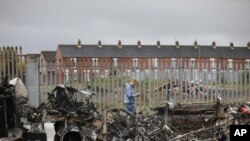Northern Ireland political leaders from all sides united Thursday to call for calm after at least four nights of street violence prompted by Brexit-induced trade barriers between the region and the rest of Britain.
The latest violence late Wednesday involved crowds of youths in the pro-British area of Belfast setting a hijacked bus on fire and throwing gasoline bombs, bricks and fireworks at police.
Members of Northern Ireland’s legislative assembly returned early from their Easter break to address the violence. While politicians from all sides previously condemned the clashes, the nationalists and unionists who lead its compulsory power-sharing coalition initially blamed each other.
But Thursday, there was a unified call for an end to the violence. Naomi Long, leader of the centrist Alliance Party, described the violence as "nothing short of disgraceful."
First Minister of Northern Ireland Arlene Foster said bad actors seek to fill the "vacuum" when politics is "perceived to be failing."
Deputy First Minister Michelle O'Neill called for politicians to stand "united" in calling out those who organize young people to take part in violence.
Britain’s decision to leave the European Union (EU) last year revived and exacerbated simmering tensions in Northern Ireland, where some people, mostly Protestants, identify as British, and others, mostly Catholic, identify as Irish and seek unity with the neighboring Republic of Ireland, which remains a member of the EU.
A 1998 peace deal that created the power-sharing government ended nearly 30 years of sectarian unrest and bloodshed, partly by ending border checks between the two Irelands and with Britain. Brexit trade rules revived some of those restrictions.





